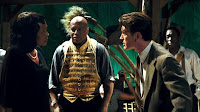Today, nontraditional productions of Shakespeare are more traditional than stagings that maintain the original eras and settings of his plays. That was not true in 1936, when Orson Welles directed a Federal Theatre production of the “Scottish Play” in Harlem. Instead of Scotland, it shifted the action to Haiti, where voodoo substituted for Celtic witchery. A platoon of ten directors and eight screenwriters recreate the behind-the-scenes drama in Voodoo MacBeth, which opens today in New York.
The public did not recognize Welles as a golden boy yet, but producer John Houseman had an inkling of his talents. However, Welles was first somewhat reluctant to tackle MacBeth with an all-black cast, but his first wife Virginia convinced him of its potential. Of course, he was already Orson Welles, by temperament, so he frequently clashed with Rose McClendon, the founder of the Federal Theatre’s Harlem division, who had originally cast herself as Lady MacBeth.
Casting the rest of the roles was tricky, but Welles saw a spark in former boxing champ Cuba Johnson, who is transparently based on the production’s real-life Banquo, Canada Lee—but the twice-married welterweight might well be surprised by Johnson’s cautious coming-out and tentative gay relationship with another cast-member. Meanwhile, Houseman must battle Rep. Martin Dies, the first chair of the House Un-American Affairs Committee for founding of their radical production.
The caucus of directors and screenwriters eagerly positions Dies as the film’s villain, but it conveniently forgets the local Communist Party violently picketed the production. Welles would have sliced and diced by an attacker, were it not for Lee’s timely intercession. Nevertheless, their Voodoo MacBeth film will inevitably be panned for giving Welles and Houseman prominent “white savior” roles, because cultural criticism has collectively lost its mind. Seriously, this would never have been picked up for distribution without Welles’ central role—and I probably wouldn’t be reviewing it.
Jewell Wilson Bridges and Daniel Kuhlman are both reasonably solid as Welles and Houseman, but they lack the flair and physical resemblances Christian McKay and Eddie Marsan brought to the famous collaborators in Richard Linklater’s unfairly overlooked Me and Orson Welles. Frankly, Bridges just lacks that Wellesian charm.
On the other hand, Inger Tudor portrays McClendon with the tragic dignity a diva deserves. Gary McDonald and Wrekless Watson also help liven up the film as the boozy Jack Carter (cast as MacBeth) and the burly Johnson. The ensemble generally keeps the backstage chaos roiling, sometimes to an almost farcical extent.
The large battery of screenwriters often takes liberties with the timeline of events. Sometimes it serves the spirit of the film, but there are a few questionable revisions of history. It is a patchy film, but the percussion and Café Society-style soundtrack is appropriate to the era and true to the real-life theater production. Interesting for Welles fans, but not recommended for general audiences, Voodoo MacBeth opens today (10/21) at the Village East.

